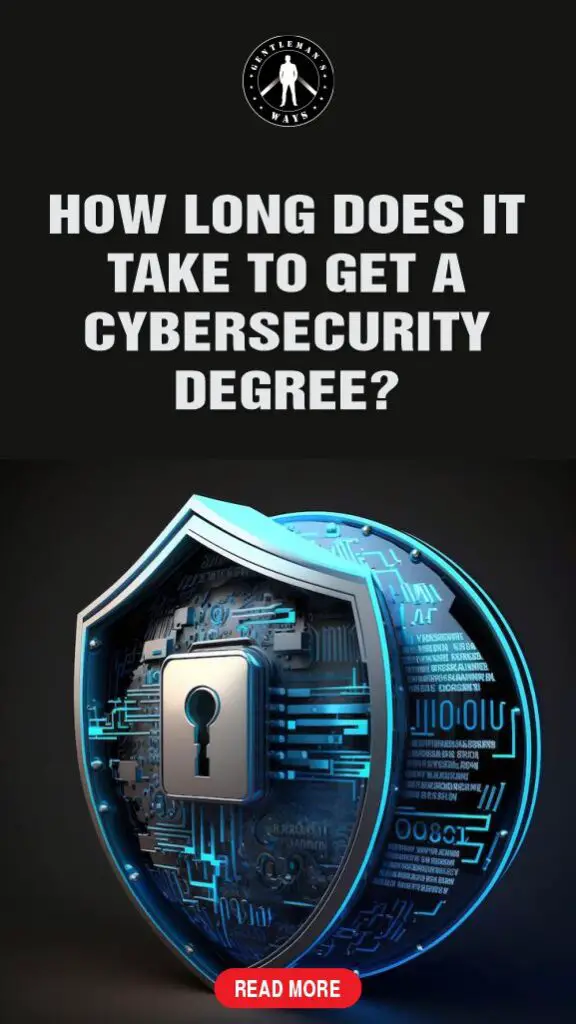Last updated on October 20th, 2025 at 02:55 am
How long does it take to get a cybersecurity degree? Learn about the timelines for associate, bachelor’s, and master’s degrees, crafted for men ready to build a secure future in cybersecurity.
Every man needs a long-term career that guarantees a livelihood. In recent years, more men like you are considering a career in cybersecurity.
With data breaches and cyberattacks making headlines, companies need skilled people who can protect their systems.
That growing demand has opened up reliable job paths for men who want long-term security and room to grow.
Before you commit, you need to know what you’re signing up for. Cybersecurity degrees come in different levels, and each takes a different amount of time to complete.
Your personal goals, schedule, and background all play a role in how long it takes.
This guide breaks down the timelines for each type of cybersecurity degree.
If you’re serious about switching careers or getting started in tech, you’ll find the information here useful for mapping out your next steps.

Types of Cybersecurity Degrees and Their Timelines
You’re thinking about a career in cybersecurity, but how long does it take to earn a degree? The answer depends on the path you choose.
Each degree option comes with a different time frame, skill level, and type of job you can get afterward. Here’s what to expect:
Associate Degree in Cybersecurity: Around 2 Years
This is the fastest way to get started. If you want to enter the workforce quickly, an associate degree might work best for you.
It usually takes about two years to finish if you’re studying full-time.
You’ll build a solid base in cybersecurity fundamentals. With this degree, you can apply for entry-level roles such as:
- Cybersecurity technician
- Network support specialist
- Junior security analyst
This path is a good fit if you’re starting from scratch or switching careers.
It gives you real-world skills that employers need without spending too much time or money upfront.
Related Posts
22 Good Careers for Men in 2025 for Future-Proof Jobs
Cybersecurity vs Software Engineering: Which Pays More?
Is Cybersecurity a Good Career?
8-Month Ultrasound Tech Program Online
Affordable Online MSW Programs for Men
Does Claflin University Offer a Nursing Program?
Top Universities for Cybersecurity
How Much Does it Cost to Get a BSN Program at Chamberlain University?
Bachelor’s Degree in Cybersecurity: 3 to 4 Years
If you’re aiming for more than just entry-level jobs, a bachelor’s degree offers broader training.
It typically takes four years to complete, though some programs may let you finish in three if you take an accelerated route.
This degree gives you hands-on experience with system design, data protection, risk management, and network security. You’ll be better prepared for roles like:
- Cybersecurity analyst
- Penetration tester
- IT security manager
A bachelor’s degree also opens the door to higher pay and more responsibility. If you’re thinking long-term, this is a solid investment.
Master’s Degree in Cybersecurity: 1 to 2 Additional Years
Already have a background in IT or cybersecurity? A master’s degree can help you move into specialized or leadership roles.
Most programs take one to two years beyond a bachelor’s degree.
You’ll go deeper into topics such as:
- Cybersecurity architecture
- Digital forensics
- Information risk analysis
This option works best if you’re aiming for roles like:
- Security consultant
- Cybersecurity director
- Chief information security officer
If your goal is to lead teams or shape policy, a master’s degree gives you the tools and credibility to do it.
Recommended: Is Keiser University Nursing Program Accredited?
Accelerated and Online Options for Cybersecurity Degrees
If you’re looking to fast-track your cybersecurity career without putting everything on hold, accelerated and online degree programs are a great option.
These flexible learning formats cater to people balancing work, family, and other commitments, allowing you to earn your degree on your terms.
Accelerated Programs: Finish Faster, Get Ahead
Accelerated cybersecurity degree programs let you complete your studies in a shorter time, usually between 12 to 18 months.
This fast-paced option is ideal for men who want to jumpstart their careers or switch to cybersecurity without the long wait that traditional degrees demand.
While these programs move quickly, they pack a lot of learning into each course.
You’ll need to handle more coursework in a compressed timeframe, but this can also mean a more intense, hands-on learning experience that’s great for mastering practical cybersecurity skills.
Online Programs: Learn at Your Own Pace
Online cybersecurity degrees bring even more flexibility. You can learn from anywhere, at any time, and interact with classmates and instructors through virtual platforms.
For men with busy schedules, this option makes it easier to study while balancing a full-time job or other responsibilities.
However, online learning requires strong time management skills. Without the structure of a traditional classroom, staying on track can be a challenge.
You’ll need to create a solid schedule, stick to deadlines, and stay motivated to keep progressing.
Choosing the Right Program
Before you commit to an accelerated or online degree, make sure the program is credible.
Check if the school is accredited and has a solid reputation in the industry.
A well-regarded degree will be valuable when you start looking for jobs, giving you a better shot at career advancement.
Accelerated and online degrees offer flexible options for men looking to get into the cybersecurity field quickly.
If you’re ready to dive in, these programs can help you build the skills you need for a successful career, all while working around your personal life.
What Affects How Long It Takes to Get a Cybersecurity Degree
When you decide to pursue a cybersecurity degree, the timeline depends on a few things.
Understanding these early on helps you plan your next steps and avoid delays.
Study Schedule: Full-Time or Part-time
If you go full-time, you’ll move through the program faster because you’re putting in more weekly hours.
This is a good fit if you can commit fully without work or family pulling you in other directions.
Going part-time stretches out the journey, but it gives you room to handle work, parenting, or other responsibilities.
This slower pace may take longer, but it’s often more manageable if you’ve got a lot on your plate.
Related: How to Know if Someone Really Graduated from a Uni
Your Previous Education and Experience
Already have some college credits or a tech background? That can shave months off your timeline.
Many schools let you transfer credits from past courses, especially if they’re related to computer science or information technology.
If you’ve worked in IT or a related field, you might already understand basic cybersecurity tools and concepts.
This can help you move through certain courses faster, or at least with less stress.
Online or In-Person Learning
Online programs give you more control over your pace. If you’re motivated and organized, you can finish your degree quicker than with a traditional classroom setup.
In-person programs usually follow a fixed schedule with set start and end dates. They may move slower, but some students prefer the structure and face-to-face support.
Related: Can Private Companies Invest in University Degree Programs?
Earning Certifications Along the Way
Adding certifications during your degree can help you start working in cybersecurity sooner. Programs like CompTIA Security Plus or CISSP are respected in the field.
Some men land entry-level jobs before they even graduate, thanks to these certs.
This real-world experience can speed up your learning and make your degree even more valuable when you’re done.
Every man’s path is different, but understanding how your choices affect the timeline can help you stay on track and reach your cybersecurity goals faster.
Related: Should You Study Cybersecurity at Nova Community College?
Frequently Asked Questions
How long does an associate’s degree in cybersecurity take?
An associate degree in cybersecurity typically takes about two years if you’re studying full-time. Part-time students may need up to three years, depending on their pace, responsibilities, and the program’s flexibility.
Can I finish a bachelor’s in cybersecurity faster than 4 years?
Yes, some schools offer accelerated programs that let you graduate in three years or less. These require a heavier course load or year-round study but can save you time and help you start working sooner.
Is it worth getting certifications while earning my degree?
Yes. Certifications like CompTIA Security Plus or Cisco’s CCNA help you gain hands-on skills, boost your résumé, and may even land you a job before you complete your cybersecurity degree program.
Does online learning take longer than in-person classes?
Not always. Online degrees can be finished faster if you’re disciplined and organized. Some let you move at your own pace, which can shorten or extend the time based on your schedule and goals.
Conclusion
Choosing a cybersecurity degree is a smart move if you’re looking to build a stable, future-proof career.
But how long it takes depends on your goals, background, and schedule. Whether you’re starting from scratch, working full-time, or already have some IT experience, there’s a path that fits your life.
From associate to master’s degrees, and flexible online or accelerated programs, you’ve got options.
Now that you understand the timelines, you can pick the one that gets you where you want to be.
Stay focused, keep learning, and you’ll be ready to step into a field that needs you.
References
Pyo Merez is a men’s lifestyle enthusiast and writer about the gentleman’s place and impact on society. Raised by a distinguished gentleman dad, he offers unique insights into how the mind of a gentleman works and how societal norms shape gentlemen’s identity and vice versa.
Through his insightful articles, Pyo taps into the depths of gentleman culture to provide perspectives on etiquette and manners in modern society.

